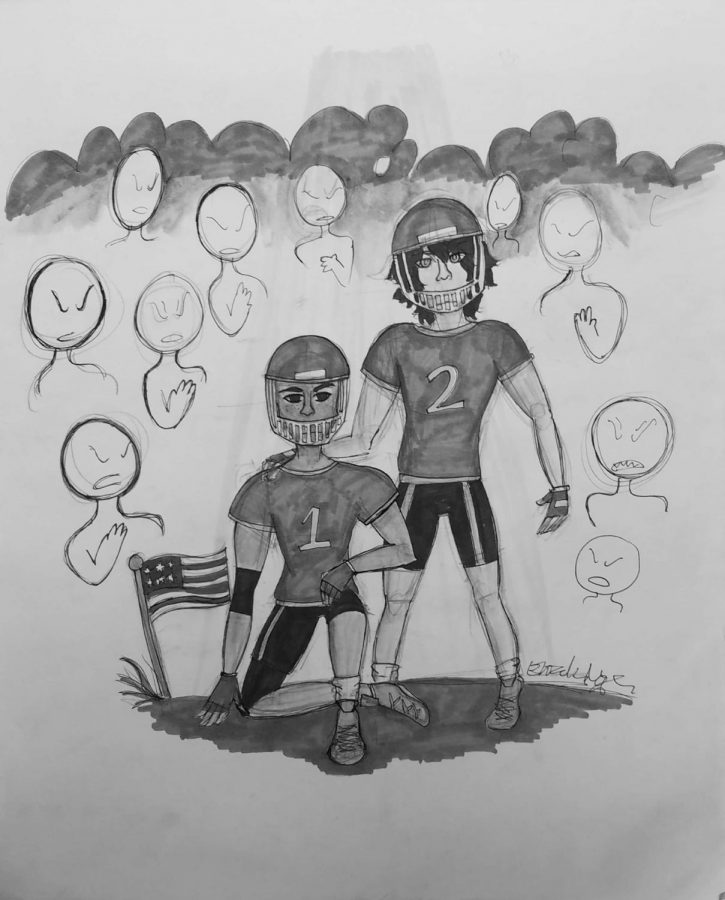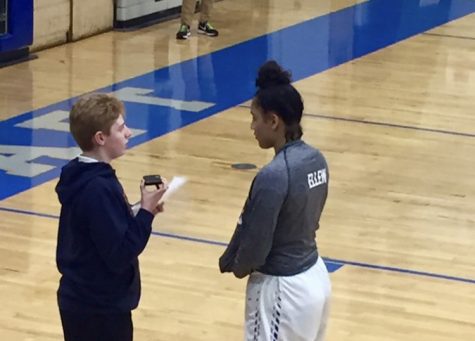Respectful speech and actions can inspire unity
The anthem starts echoing through the school and all of a sudden, half the room is standing and the other half is not. A typical morning at Lane begins with some students expressing their opinions through actions. These actions put them at risk of being judged by others who do not feel the same.
On Sunday afternoons, the same scenario plays out on the gridiron in dozens of cities in front of venues filled with partially hostile crowds. The tense couple of minutes are a result of a type of free speech that has seen its message diluted and thrown into a frenzy over a completely different issue.
A football player, or any citizen in general, should be able to make the decision to drop down on one knee or take a seat during the anthem to make a statement for their cause. They have the ability to protest because of the rights that people fought for and what the flag that they refuse to stand for represents.
These players are members of this country just like everyone else and aren’t un-American because they take a stand for something that is important to them. Not standing for the anthem is not about being disrespectful to those who gave their lives to defend ours. Choosing to kneel is not deserving of the level of attack it receives.
At Lane, many students may not stand during the anthem, because they are disappointed with the political climate President Donald Trump has created or simply to show support for players like Colin Kaepernick. Kaepernick was the first athlete to kneel during the anthem.
Furthermore, the reason that certain players decided to start kneeling shouldn’t be forgotten in all the arguments about the respectability of kneeling. Choosing not to stand for the flag goes back to the issue of race. Kaepernick and other players felt there was growing injustice with the treatment of minorities by law enforcement, according to an interview he had with NFL media last year.
Like NFL players who kneel or sit, students should forever have the option to sit or stand when the anthem plays. As long as a student is not being disruptive, and pays the same amount of respect to their peers who choose to stand, they should never have to deal with backlash from staff or administration for their decision.
Being respectful means students not being on their phone, talking or creating a lot of commotion by digging through their stuff or completing homework.
Some teachers may not know how to address disrespect during the anthem because It becomes tough for them to try and dictate over students with strong and valid opinions.
This similarly occurs in the hallways while the anthem is playing. Although there is no rule in the student handbook about stopping in the halls during the anthem, many teachers stand outside their classrooms telling students to stand still on their way to class.
Given the sensitivity of the issue on both sides, there needs to be more direction and transparency that could start with the administration about conduct during the anthem.
There shouldn’t be any strict rules that force students to participate when they have strong reasons not to. However, there could be guidelines about phone usage and respecting peers that could help teachers dissuade students from staying seated because they don’t feel like standing on a given morning.
This debate of the anthem should rally the student body to unify a mutual respect for different opinions on sensitive issues. The respect cannot be confused for an opportunity to take advantage of not being required to stand. If the student truly has motivations that are fueled by injustice in America or any problem that is close to them, then by all means they should be free to sit and exercise their right to protest.
This same kind of mutual respect should translate outside of Lane’s walls. Words matter more than many people realize, especially those of our role models and leaders.
In week three of the NFL regular season, dozens of players either kneeled or locked arms during the anthem. The Pittsburgh Steelers went as far as not even exiting the locker room until after the anthem was finished. The only exception was offensive tackle Alejandro Villanueva, who served three tours of duty in Afghanistan.
The root of these expanded protests is where the real issue stems from. If the sitting president of the United States had not resorted to name calling and childish antics over social media to assert his own opinion on the debate, teams may never have felt the need to make bolder statements.
President Trump could just as easily have written a better and more professional argument as to why he felt kneeling during the anthem was unacceptable. This would not have been an issue, as he is entitled to his opinion and free to express his beliefs and values.
Prior to the string of comments by Trump attacking several athletes, there was only a handful of players in the league that chose to kneel or sit. Hateful rhetoric from many different outlets fueled the players to take action.
Not everyone may agree that their form of protest was the best way to convey their dismay for the political climate and culture that America faces, but everyone should understand that it is necessary to speak up against hate and demeaning speech.
Letting yourself and those around you be degraded by verbal attacks is not better than kneeling during the anthem. If the players remained silent and continued on with the regularly planned festivities, the conversation would have never been started. It would continue to allow comments that lack respect to tear apart the credibility of this nation.
Standing by a teammate and a friend whether you agree with their actions or not is closer to the principles that everyone should strive for.
The athlete that takes a knee and gets booed by half of his own team’s fans likely doesn’t enjoy the feeling. It also can’t feel good to be one of the players called a “son of a bitch” and to have words placed in your own mouth by the president.
Too many people jump on the opportunity to throw out hate and hurtful opinions. We often make assumptions about the motives of actions that are not our own. The actions may not be fully understood due to a lack of personal connection to their motives for kneeling.
Kneeling during the anthem might be more controversial than organizing a march or rally, but it is still a form of peaceful protest. If we stifle the voice of any American because we do not agree with the way they are expressing their beliefs, it only takes us down a counterproductive path.
Everyone should find it in their heart to try and see anthem protests for what they really are and consider the possibility that there is no right stance on the issue, as long as our words and actions bring us together.
Your donations directly fund the Lane Tech student journalism program—covering essential costs like website hosting and technology not supported by our school or district. Your generosity empowers our student reporters to investigate, write, and publish impactful stories that matter to our school community.
This website is more than a publishing platform—it's an archive, a research tool, and a source of truth. Every dollar helps us preserve and grow this resource so future students can learn from and build on the work being done today.
Thank you for supporting the next generation of journalists at Lane Tech College Prep!





